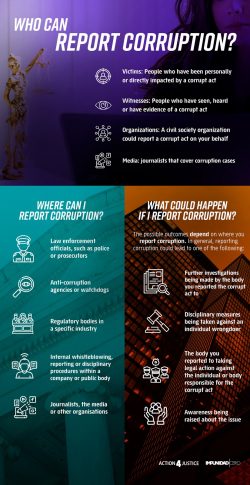How Can I Report Corruption?
If you have evidence a corrupt act may have taken place, the next step will usually be to report the corrupt act to an authority that can investigate and take action against the wrongdoer.
What Does it Mean to Report Corruption?

Practical Tips for Reporting Corruption
Although there will be specific requirements for different reporting procedures, this section outlines a number of general tips that can increase the chances that the body you report to will take action after receiving your report.
(a) What Should I Include in My Report?
You will need to convince the person or body dealing with your report that the corrupt act happened or may have happened so they should investigate further. The exact information you include will depend on the body you are reporting to and the corrupt act you are reporting but below are some general rules you should follow.
Practical Tips: Checklist for Written Reports
Prepare a document in which you explain your complaint. In this document you should:
- Describe the act or decision which was brought about by corruption.
- Explain the role of the wrongdoer.
- Provide information about your relationship with the wrongdoer and summarise any dealings that you had with them.
- State the reasons why you consider the act or decision was motivated by corruption.
- Identify the evidence that supports your claim throughout the document.
- Explain the consequences of the corrupt act or decision, and the reasons why it has caused you or other people loss.
- Explain what would have happened if the corruption had not taken place.
- Explain what action you want the body receiving your report to take.
Generally, your complaint should be structured in a chronological way, with the earliest events in time coming first and the most recent events coming last.
Although you won’t need to provide as much evidence as you would have to in court (i.e. there is no strict standard of proof you need to reach), you will still need to gather evidence to show that there are some grounds to suspect that the corrupt act you have complained about happened and that your complaint has some basis. For tips on what evidence could be helpful, see How Can I Prove Corruption?
(b) Putting Pressure on the Reporting Body
One of the most effective ways to challenge corruption and to get authorities involved in the case is to pressure governments to be aware that this situation is happening, it’s unlawful, and it’s affecting you and other people.
Social media is one of the key tools you can use to get people to learn about your case and start campaigning. You can start out by making visual materials that sum up the issue and outline the implications of the corrupt act and identify the people who are being affected.
You can also send information to local organisations (such as petitioning members of the parliament or congress, or local council and elected bodies which have an oversight function) and contact well-established NGOs in your country. These do not need to be related specifically to corruption, but can also be related to human rights.
Similarly, you can also rely on the media to expose the case; you can look for specific journalists that cover corruption cases in your country and provide them with the evidence you have gathered and the proof of how this situation has impacted your community.
- For example, we recommend you to support your arguments with specific data (eg. the money embezzled was initially allocated to build 20 schools, this corrupt act has affected more than 500 children in my community) and key supporting evidence.
In some countries, media can be the most effective way to challenge corruption.
By exposing the case you may also be able to prevent retaliation from the people involved in the case. For more information, see Alternative Reporting Channels.
Where Should I Report Corruption?
As demonstrated in the infographic, you may be able to report corrupt activity to the following bodies:
- Law enforcement authorities, such as police and/or prosecutors;
- Anti-corruption agencies or watchdogs;
- Internal and external reporting procedures; or
- NGOs, journalists or the media.
The following sections of the Guide will provide information on each of these possibilities, their advantages and disadvantages, and the outcomes that could result from making a report.
When reading the next sections, think about these questions:
-
Does this option exist in my country? Or could it be used in my case?
-
Is it safe to report corrupt activity to this body?
-
Could this lead to the outcome I want?
Practical Tip: Making Use of Multiple Reporting Procedures
It may be possible and useful to report a corrupt action to more than one body.
- If one body does not take further action, the other one might take action.
- Also, information gathered during one reporting procedure (e.g. a journalist/NGO investigation or an internal reporting procedure) could be used to make a later report to a different body (e.g. the police or an anti-corruption agency).
- If you make a report to an NGO or a media outlet, they could put pressure on a different body (e.g. police/prosecutors or an anti-corruption agency) to take action.
Practical Tip: Be Aware of the International Dimension
Corruption often crosses borders. Corruption transactions can involve people, property or organisations in different countries. Because of the international nature of corruption, it’s often possible to report suspected corruption to authorities in different countries. For example, corruption in Kenya involving a British company could be reported to police in Kenya and the sector regulator or to an anti-corruption agency in the UK.
Think about what countries the corruption in your case involves and where it would be most effective to report the suspected corruption.